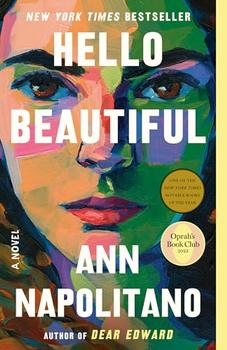Summary | Excerpt | Reading Guide | Reviews | Beyond the Book | Readalikes | Genres & Themes | Author Bio

A Novel
by Ann NapolitanoWilliam
February 1960–December 1978
For the first six days of William Waters's life, he was not an only child. He had a three-year-old sister, a redhead named Caroline after John F. Kennedy's daughter. There were silent home movies of Caroline in which William's father looked like he was laughing, a sight William never saw again. His father's face looked open, and the tiny redhead, who pulled her dress over her face and ran in giggling circles in one of the movies, was apparently the reason. Caroline developed a fever and a cough while William and his mother were in the hospital after his birth. When they came home, the little girl seemed to be on the mend, but the cough was still bad, and when her parents went into her room to get her one morning, they found her dead in her crib.
William's parents never mentioned Caroline while William was growing up. There was one photograph of her on the end table in the living room, which William traveled to occasionally in order to convince himself that he'd actually had a sister. The family moved to a navy-shingled house on the other side of Newton—a suburb of Boston—and in that house, William was an only child. His father was an accountant who worked long hours downtown. With his daughter gone, the man's face never opened again. William's mother smoked cigarettes and drank bourbon in the living room, sometimes alone and sometimes with a female neighbor. She had a collection of ruffled aprons that she wore while preparing meals, and she became agitated whenever one became stained or messy.
"Maybe you shouldn't wear the aprons while you cook," William said once, when his mother was red-faced and on the verge of tears over a dark blotch of gravy on the fabric. "You could tuck a dish towel in your belt instead, like Mrs. Kornet does."
His mother looked at him as if he'd spoken in Greek. William said, "Mrs. Kornet, who lives next door? Her dish towel?"
From the age of five, William would walk to the nearby park most afternoons with a basketball, because basketball, unlike baseball or football, was a game he could play alone. There was a neglected outdoor court that usually had a hoop free, and he would shoot for hours, pretending he was a Celtics player. Bill Russell was his favorite, but to be Russell you needed someone else to block or defend against. Sam Jones was the best shooter, so William was usually Jones. He tried to imitate the guard's perfect shooting form while pretending the trees that surrounded the court were cheering fans.
One afternoon when he was ten years old, he showed up at the court and found it occupied. Boys—maybe six of them, about William's age—were chasing one another and a ball between the hoops. William started to back away, but one of the boys called, "Hey, wanna play?" And then, without waiting for William to answer: "You're on the blue team." Within seconds, William was swept into the game, his heart pounding in his chest. A kid passed him the ball, and he passed it right back, afraid to shoot and miss and be told he was terrible. A few minutes later, the game broke up abruptly because someone needed to get home, and the boys spilled off the court in different directions. William walked home, his heart still rattling in his chest. After that, the boys were occasionally on the court when William showed up with his ball. There was no discernible schedule to their appearances, but they always waved him into the game as if he were one of them. This never stopped being shocking to William. Kids and adults had always looked past him, as if he were invisible. His parents hardly looked at him at all. William had accepted all of this and thought it was understandable; he was, after all, boring and forgettable. His primary characteristic was pallor: He had sand-colored hair, light-blue eyes, and the very white skin shared by people of English and Irish descent. On the inside, William knew, he was as uninteresting and muted as his looks. He never spoke at school, and no one played with him. But the boys on the basketball court offered William a chance to be part of something for the first time, without having to talk.
From Hello Beautiful by Ann Napolitano. Copyright © 2023 by Ann Napolitano. Published by The Dial Press, an imprint of Random House, a division of Penguin Random House LLC. All rights reserved.




The only completely consistent people are the dead
Click Here to find out who said this, as well as discovering other famous literary quotes!
Your guide toexceptional books
BookBrowse seeks out and recommends the best in contemporary fiction and nonfiction—books that not only engage and entertain but also deepen our understanding of ourselves and the world around us.